Final
Deadline
April 16, 2026
Judging
Date
May 18, 2026
Winners
Announced
June 10, 2026
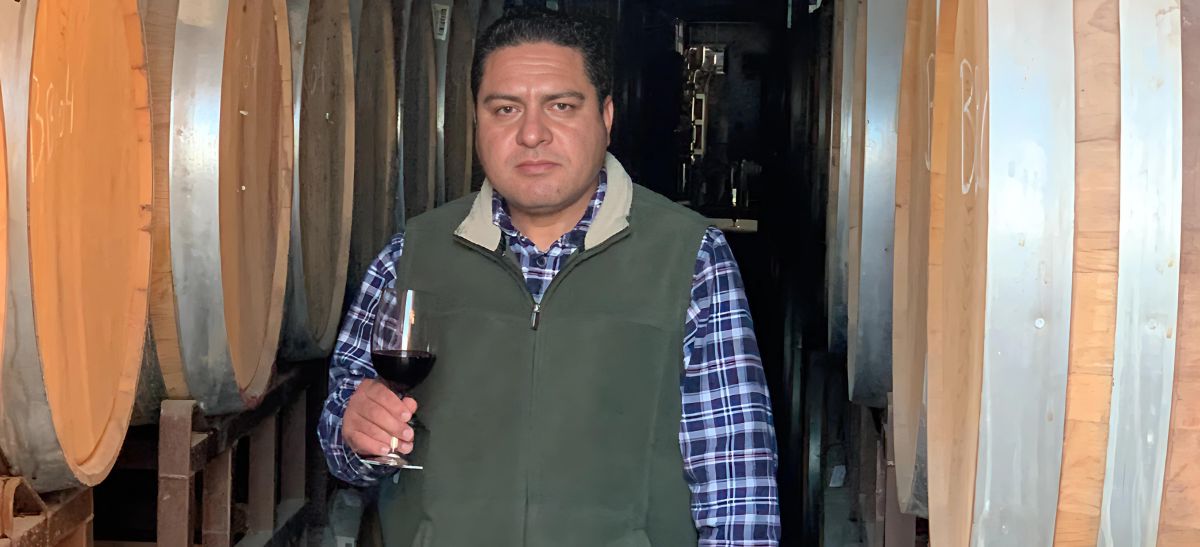
Let’s embark on a journey through time and tradition with Gibson Wine Company, where dedication to quality and a commitment to innovation have been the cornerstones of their success since 1939. From humble beginnings rooted in the rich soils of Sanger, California, to becoming a steadfast name in winemaking, Gibson Wine Company has created a range of wines par excellence. We spoke to Winemaker, Pablo Avlos about the company's history, explored their sustainable production methods, and discussed their marketing and growth strategies.
Gibson Wine Company was founded in the 1890s but was officially incorporated in 1939 as Sanger Winery Association, and remained with the ownership group until 1961. In that year, the winery was purchased by a group of local growers who established the Gibson Wine Company Cooperative as it is known today. The Group of growers who bought the winery initially bought it intending to make brandy and bulk wine to sell on the bulk market. At that time most of the grapes that were used for the Brandy and bulk wine production, were the tailings of table and raisin grapes which the growers were recovering after the premium grapes were used as table and raisin grapes. In the early years, the winery was very successful Winery with facilities in Kentucky and Elk Grove California, along with the only remaining facility in Sanger California. Eventually, the winery changed their production from Brandy and bulk wine grapes to more well-known and premium wine varietals which have allowed us to make the current premium wines. The current group of growers that are leading the winery are committed to making premium wine, and with that in mind, they try to deliver the best grapes they can to the winery. They know that if they deliver good quality grapes, we will be able to reach our goals of making premium wines, and that is something I appreciate because it is easier to make good wines when you have quality grapes.
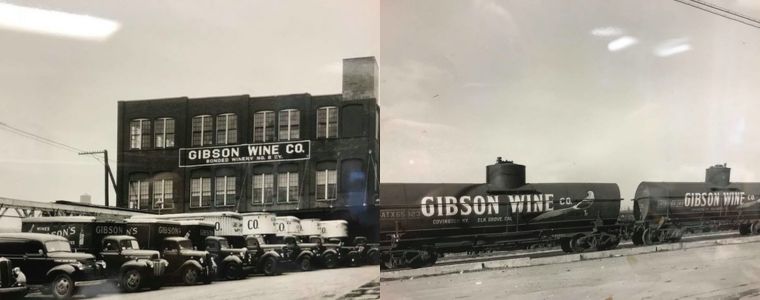
Image: Gibson Wine Company in 1974
The way I ensure that we have consistency in our wines is by working with the growers to use best practices. Also, I try to use the same chemicals and oak products that have been working well for us and wine styles. Some challenging years make things a little more difficult to be able to reach the same quality and profiles, but I always find ways to match the previous vintages. Some of the things I do in those instances is to ferment different batches with different yeast and different chemicals to be able to have more components to make the blends as consistent as possible.
In the vineyards, I monitor the evolution of the new crops, and I suggest picking dates to ensure that we pick the grapes at their optimum maturity and flavor points. The growers are highly committed to delivering the best fruit, and they are patient to wait for the best moment to pick the grapes.
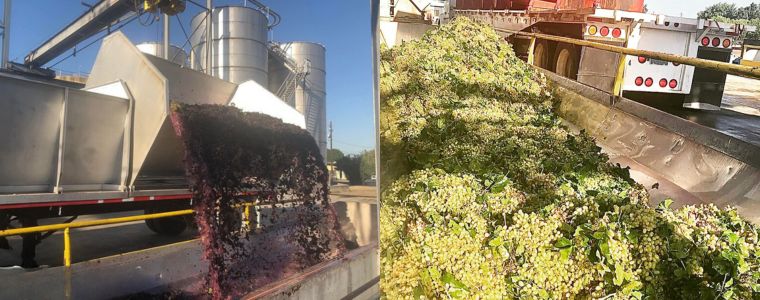
Image: Harvested grapes at Gibson Wine Company
Right before we bottle, we make the blends, and we follow up all the filtration and adjustment processes to ensure that we don’t alter any of the chemistry, aromas, and flavors. After a final evaluation, we send the wines to the bottling line to be bottled.
What sets Gibson Wine Company apart in terms of its production methods is that we try to use traditional methods, and we try to use the least possible chemicals. That way we can make our wines as natural as possible, to give our customers wines that reflect the pureness in which they were made. We are not organic wine producers, but we do try to use as little as possible chemicals in the vineyards and from there to the winery. We believe that our customers deserve to have wines that can contain the fewest possible traces of pesticides because that will help them to have a healthier life.
In the same way, we demand our Oak and other additives to supply us with the most chemical-free products to be in line with our goals of making the best and most natural wines.
We perform some practices in the vineyards in which we only use the really necessary pesticides, and we disk and mow the vineyards to control the weeds instead of using herbicides. We try to maintain a fertile soil by adding compost which is made from grape pomace and cow and horse manure from local farms, and that helps the soil to have the required nutrients for the plants. We are fortunate to have our Winery located in the Central Valley of California, where there are many farms where we can obtain the manure and compost we use as soil nutrients. Once we started to use natural soil nutrients, we noticed that there were better quality grapes at the time of harvest, because we have healthier plants, with a larger canopy and larger and healthier grape clusters.
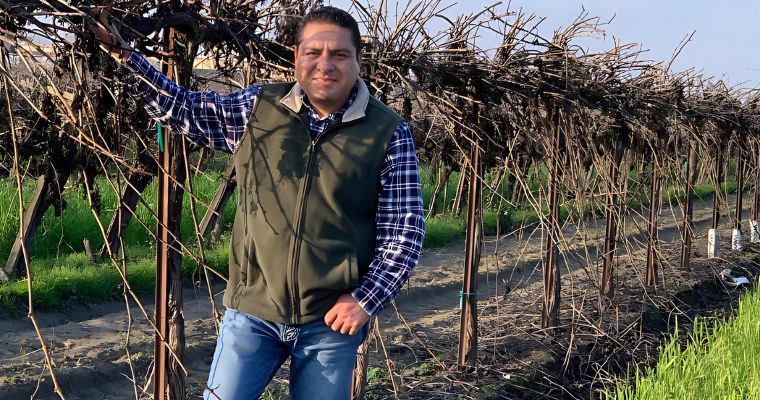
Image: Pablo Avlos
Gibson Wine Company has historically been well-known for its delicious dessert wines, but we have been adding other products to our product line. Our products range from traditional varietal table wines to dessert wines, cooking wines, fruit wines, and Brandy. All those products allow us to have a very diverse portfolio of products to offer to our customers. We have something for everyone, and that has been one of the key changes we have made. Our customers always find at least one of our wines that they like, and they always take bottles of those wines with them. It is gratifying to see how people enjoy our wines and pick something from the many options they have to choose from.
We have been promoting our wines on social media as well as radio and billboards, to be able to reach a broader audience. We understand that not everyone uses social media which is the most common tool to promote products and services, and by using radio and billboards, we have the opportunity to reach more people. Billboards in particular have been helpful because many people driving through can see our products being promoted and they give it a try.
We have heard many customers who come to the winery to buy wine saying that they did see our wines promoted on the billboards they see on the roads or local streets. Also, we participate in as many wine-tasting events as we can to help promote our wines and to be able to reach new customers who otherwise wouldn’t have the opportunity to try our wines.
I collaborate with our grape growers overseeing the growing season as well as the maturity season to ensure that we harvest our grapes at the right maturity time, in which I think we will be able to make the best wines. It is always important to count on a team of growers who understand how important is to grow good quality grapes because that will dictate how good our wines will be at the time we bottle them. I usually go around all the Vineyards to see how are they evolving, and from that point, I start imaging which programs those grapes will be used for. I can see from the start of bud break which blocks have the potential to be used for our higher tier wines, and which ones will be used for our dessert or cooking wine programs. Therefore, it is really important to count on growers committed to striving to grow quality grapes, because they will also get more money for their grapes.
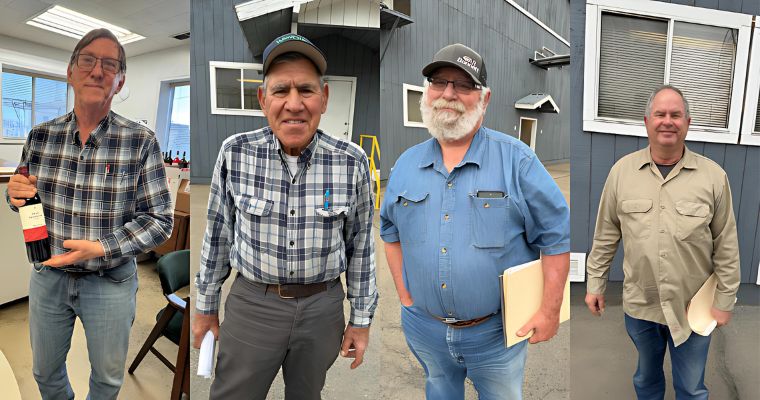
Image: (L-R) Grower - Jim Kerle, Marvin Caprelian, Mark Allen, and Pete Filippi
Participating in wine competitions such as the Sommelier Choice Awards has been playing a very important role in increasing our presence in restaurants and grocery stores. We have been receiving a response from people who have seen our wines awarded in wine competitions, and they like to try them out. Participating in wine competitions is a good way to put our wines in front of wine business professionals who taste and rate our wine, so that way we can tell how good our wines are. Also, those competitions help us to see who our competitors are in each category, because by knowing that, we can tell who our potential customers are. Knowing who our potential customers are helps us to better target them when we launch our marketing campaigns.
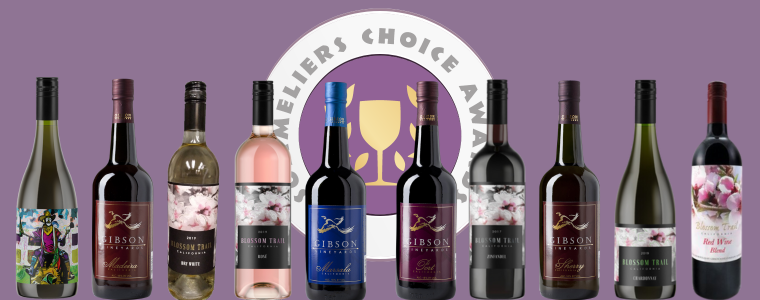
Image: Winners of Sommeliers Choice Awards 2022.
Our plans for future growth are to try to hire more sales employees to have them reach out to more customers around the country. We need to have more presence in all the States, because right now we don’t have a presence in all the States, and in many States, we only have a presence with our dessert and cooking wines. The long-term goal is to grow the business to where one day we were when we had the wineries in Kentucky and Elk Grove. It might take some years to get there, but I believe that we have the main thing which is good quality wines, and a reliable source of grapes to have consistency in all our wines. From there, we can start growing the business, and start expanding little by little.
[[relatedPurchasesItems-61]]
As we conclude our editorial journey with the Gibson Wine Company, it becomes evident that their success is not merely measured in bottles sold but in the timeless commitment to quality, sustainability, and the preservation of tradition. With a steadfast dedication to excellence and a vision for the future, Gibson Wine Company continues to raise the bar in the world of winemaking, leaving a mark on the industry and the palates of wine enthusiasts worldwide.
In conversation with Malvika Patel, Editor and VP, Beverage Trade Network
Enter your Wines now and get in front of top Sommeliers, Wine Directors, and On-Premise Wine Buyers of USA.
